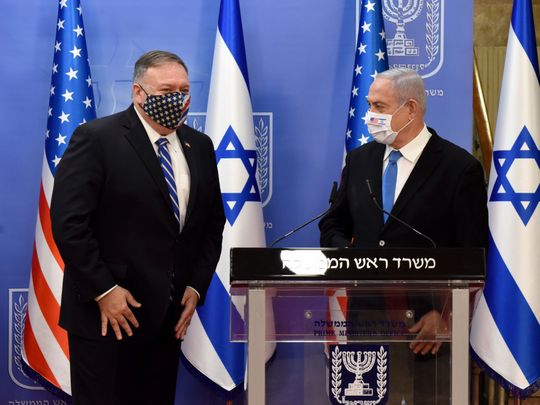
Occupied Jerusalem: US Secretary of State Mike Pompeo said he hoped other Arab countries would also establish diplomatic relations with Israel as he kicked off a Mideast tour on Monday to press the momentum of the Trump administration’s Arab-Israeli peace push.
Pompeo spoke during a joint statement with Israeli Prime Minister Benjamin Netanyahu in occupied Jerusalem, the first stop on a multi-country tour of the region following the August 13 announcement of the historic agreement between Israel and the UAE, brokered by Washington, to establish diplomatic ties.
“I am hopeful that we will see other Arab nations join in this,” Pompeo said. “The opportunity for them to work alongside, to recognise the state of Israel and to work alongside them will not only increase Middle East stability, but it will improve the lives for the people of their own countries as well.”
The Israel-UAE agreement delivered a key foreign policy victory to President Donald Trump as he seeks reelection and reflected a changing Middle East in which shared concerns about archenemy Iran have largely overtaken traditional Arab support for the Palestinians.
Both Pompeo and Netanyahu criticised the lack of international support for the US demand for the restoration of UN sanctions against Iran. The Trump administration has been pushing at the Security Council to have so-called “snapback” sanctions imposed on Iran over what Washington says is Iran’s violation of the 2015 nuclear deal with world powers.
“We are determined to use every tool that we have to ensure they can’t get access to high-end weapon systems,” Pompeo said. “The rest of the world should join us.”
Earlier this month, the US, Israel and the UAE announced the deal to establish full diplomatic relations, which also requires Israel to freeze its plans to annex parts of the occupied West Bank sought by the Palestinians as part of their future state.
Netanyahu called the agreement “a boon to peace and regional stability” that “heralds a new era where we could have other nations join”.
Later in the trip, Pompeo was to meet with Netanyahu’s partner in the government and Defence Minister Benny Gantz, as well as Foreign Minister Gabi Ashkenazi.
After his Israel stop Pompeo was also slated to visit Sudan, the UAE and Bahrain, with additional stops in the Gulf possible, the State Department had said. In Sudan, the secretary of state said he would push for “deepening the Sudan-Israel relationship”.
British Foreign Secretary Dominic Raab was also arriving in occupied Jerusalem on Monday for meetings with Israeli and Palestinian officials in an effort “to press for renewed dialogue” and a negotiated two-state solution to the conflict. Ahead of Pompeo’s arrival, the Israeli military said it struck Hamas targets in the Gaza Strip early on Monday, in response to incendiary balloons launched into Israel the day before. The army said it bombed “military posts and an underground infrastructure” belonging to Hamas, the Palestinian group that rules Gaza. There were no immediate reports of any casualties.








